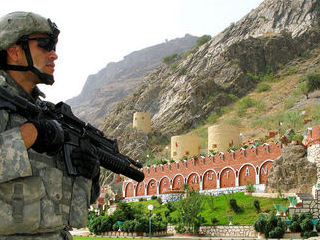Andrew Gonyea
Communications Assistant
Since 2001 over 770,000 reserve component service members have been activated. Winning in Iraq and Afghanistan has required a significant shift from a strategic to an operational reserve. As we move into an era of increasing defense budget constraints and internal competition for Pentagon resources, what role will the operational Guard and Reserves play?
ROA Current Issues: Operational Reserve
That question is the focus of a recent feature article in the National Defense University’s October 2010 Joint Forces Quarterly (JFQ). Dr. John A. Nagl, president of the Center for a New American Security (CNAS), and Travis Sharp, research associate at CNAS, see significant omissions in the 2010 U.S. Quadrennial Defense Review (QDR) about what specific roles and missions the operational reserve will provide in the future. This is a big problem, they note, because the longer it takes to address those omissions, the more likely it is that proper funding for maintaining an operational reserve will disappear.
The QDR cites the need for an operational reserve force for “preventing and deterring conflict” in the emerging international security environment, but fails to specify roles, missions, strength, capabilities, and necessary equipment. To address those topics for the reserve components, a new review, to be completed by spring 2011, is being carried out by Gen. James Cartwright, vice chairman of the Joint Chiefs of Staff, and Dennis McCarthy, assistant secretary of defense for Reserve Affairs (and former ROA executive director). It is expected that this review will be the subject of Secretary McCarthy’s presentation at ROA’s National Security Symposium Jan 31.
According to the article, Nagl and Sharp expect the review will recommend that the reserve components fulfill the following broad, significant missions:
• Contribute to homeland defense and civil support capabilities
• Assist partner nations in improving their own security capacity
• Maintain awareness of capabilities, values, intent, and decision-making of potential adversaries
• Support diplomatic and development efforts and strengthen governance
• Extend global, forward defense posture
• Protect defense infrastructure in space and cyberspace
• Build tailored regional deterrence architectures and missile defenses
• Overcome anti-access weaponry and tactics
The article states the reserve components already have a significant portion of the military’s capabilities in these areas. Among many contributions, the Army Reserve provides civil affairs capacity, expeditionary sustainment commands, military police commands, and information operations groups; the Air Force Reserve provides airlift, theater intelligence, and air operations center capacity; and the Navy Reserve provides Navy Expeditionary Combat Center forces for explosive ordinance disposal, construction and engineering, port and cargo handling, and building partner security capacity.
Despite these many important contributions, the reserve components, which make up 43 percent of the total force, consume just 9 percent of the Department of Defense (DoD) annual base budget. And with the wars in Iraq and Afghanistan winding down and competition for Pentagon resources increasing, Nagl and Sharp predict that some military leaders will suggest that the Reserves downsize and go back to a strategic status. Nagl and Sharp rightly point out that, especially after the past decade of serving side by side, it’s time to move past cross-component rivalries and focus on building a total force that utilizes properly-funded, properly-employed Guard and Reserves.
Read the full article – Operational for What? The Future of the Guard and Reserves.
ROA remains committed to appropriately funding and equipping the operational reserve needed to keep America safe in the 21st century.
ROA Resolution No. 09-04 – Management of Operational and Strategic Forces of the Reserve Components




